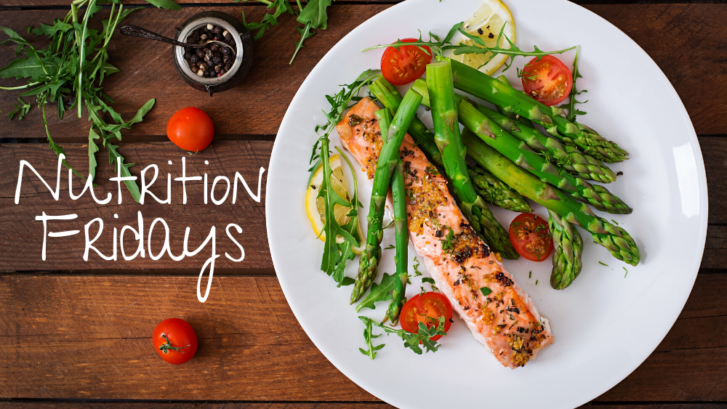March is National Nutrition Month!
Nutrition informs everything we do. Nutrients and other substances in food are responsible for bodily maintenance, growth, reproduction, and health. By and large, food is great, but if people aren’t getting the right combination of nutrients, it can have adverse affects on their general health. The Academy of Nutrition and Diabetics celebrates National Nutrition Month, so every year for the whole month of March, organizations across the country spend extra time and energy focusing on different aspects of nutrition. This year’s theme is “Eat Right, Bite by Bite,” and this catchy phrase is meant to emphasize eating nutritious food rather than doing restrictive diets. Small changes to your diet can positively affect your health over time, and since we are dedicated to health, Healthpointe thought it appropriate to talk about nutrition and the choices we make when it comes to food.
Nutrition is a science….
…and because of that, there are quantifiable observations that can be made about nutrition based on scientific methods. While general nutritional health won’t be the most popular ‘fad diet’ out right now, a broad knowledge of your nutritional needs can get on you the right path towards your wellness goals. Nutritional health goes far beyond just ‘losing weight’; weight loss can be achieved through any number of ways, and many of those methods are not nutritionally adequate. Further, it’s important to understand that weight isn’t the sole factor in determining.
Nutritional Needs
Nutritional needs vary from person-to-person based on your age, height, weight, activity level, and more. There are many nutritional needs calculators available online, and using the above information about yourself, a general estimate can be established. In a broad sense, everybody needs a combination of the six major nutrient groups: Proteins, Carbohydrates, Minerals, Fats, Vitamins, and Water. These nutrients are essential because the human body can’t create enough of them on its own, which means we have to rely on outside sources in order to fulfill these needs.
Protein
High-protein diets are generally very popular because of the emphasis on meat items, such as hamburgers and steaks.
However, with veganism and vegetarianism on the rise, plant-based protein is becoming much more commonplace. “Protein [is a nutrient that] provides the building block of the body,” as reported by Healthline. All of our cells contain protein, and it is key in bodily growth, health, and maintenance.
Meat, fish, milk, and eggs are all good sources of protein. Plant-based options include seitan, edamame, wild rice, and chia seeds. You want to consider a wide range of options when thinking about your protein consumption – according to Kaiser Permanente, up to 20% of your calories should come from protein.
Carbohydrate
Who doesn’t love carbs? Carbohydrates are in some of our favorite foods: pasta, bread, soda, cake. The human body gets energy from carbohydrates. However, by now, most people are aware of the harsh negative effects that carbs can have on our bodies. Over-consumption can contribute to diabetes, and although we established earlier that weight isn’t an overall indicator of health, there is a correlation between excessive carb consumption and weight gain due to the amount of carbs found in high-calorie foods. So, while carbs themselves don’t cause weight gain, you should still be sure that you are ingesting the right kinds of carbs. Many contemporary diets are low-carb, and there are many low-carb alternatives to some of our favorite carb-heavy foods.
Whole grains, beans, and most vegetables are nutrition-heavy sources of carbohydrates. Many companies make vegetable-based pastas rather than typical noodles. Some bread makers are putting out more whole grain breads as well as thinner wraps and tortillas. According to the Mayo Clinic, a healthy diet should consist of somewhere between 45-65% carbohydrates.
Fats
Fats are somewhat controversial to address as a healthy food because of the negative association with the word ‘fat,’ but nevertheless, they are
nutritionally vital. According to the Dietary Guidelines for Americans, healthy fats should make up about 25-30% of your diet. The emphasis here should be on healthy fats, so no, cookies and chips shouldn’t make up 30% of your daily diet.
Healthy fats include omega-3 and omega-6, which can be found in nuts, seeds, and vegetable oils, especially coconut oil. Things like butter, cheese, red meat, and ice cream are also sources of fat, but should be consumed in moderation because they aren’t considered healthy fats.
Minerals
Minerals are somewhat like vitamins.. They are found in many of the foods we eat. According to Healthline, some of the most common minerals include calcium, iron, and zinc. Minerals contribute to a variety of bodily processes, from heartbeats to nerve impulses. Minerals are often overlooked because they’re not talked about as much, but nevertheless, they are vital to good nutrition in the human body.
Calcium is vital for bone health, and milk has long-been the standard food item that addresses the need for calcium. Other foods, such as salmon and cheese, are also calcium heavy. Plant-based alternatives include broccoli and other greens like Swiss chard. Iron is beneficial for moving oxygen around the body. Red meat and eggs are good sources of iron, while leafy greens and dried fruits are adequate, plant-based alternatives. Zinc helps the body’s immune system, and legumes are the most common foods that are rich in zinc. That being said, beef, pork, and dark meat chicken are also zinc heavy.
Vitamins
Vitamins are similar to minerals, and many people turn to supplements to fulfil their dietary need for vitamins.
Vitamins are integral in staving off disease , such as rickets or scurvy, and can help lower the risk of some cancers. Each vitamin plays a key role in overall nutritional health, and certain vitamins affect different areas of the body. Common vitamins include vitamin C, A, and E.
According to Family Doctor, eggs, carrots, and sweet potatoes are Vitamin A heavy foods. Oranges and kiwis are full of Vitamin C, while avocados, nuts, and spinach are great sources of Vitamin E.
Water
As with all bodily health plans, the importance of water really can’t be overstated. It improves brain function, makes people more alert, and is vital to the body’s daily processes. Your specific water needs depend on your sex, weight, activity level, and other factors, but an average estimate is between 11.5-15.5 cups daily. That doesn’t mean you have to constantly drink water – fruits like watermelon are extremely hydrating!
How You Can Celebrate Nutrition Month
At Healthpointe, we are dedicated to your health first and foremost, and anything we can do to get you on track with your nutritional and health goals is our priority.
How do you plan on participating in National Nutrition Month? Sound off in the comments! If you are interested in more of Healthpointe’s services, click here. For appointments, click here or call (800) 956-2663. For more information about what Healthpointe is up to, keep up with our blogs!
Stay healthy with Healthpointe!







